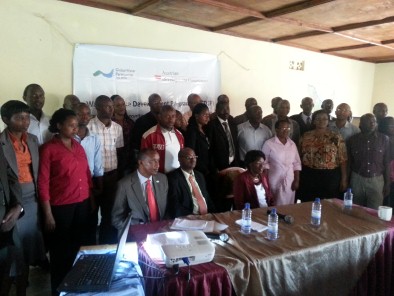A series of workshops were held between August and December 2012 in both countries as part of the Water, Climate and Development Programme (WACDEP) in Africa. Prior to these awareness-raising activities, citizens living around Lake Cyohoha perceived the lake as a state-owned resource, with little attention given to its protection from damaging human practices and natural hazards such as floods, drought, and depletion of fisheries.
Rwanda and Burundi local government actors
The workshops included a one day meeting with Rwanda and Burundi local government actors on 23 October 2012, a consultative session with a multi-disciplinary team of experts from the two countries on 21 November, and a situation analysis validation workshop 20-22 December. Mid-level decision-makers, technicians, local governance institutions, fisheries, and water users’ cooperatives committed to collaborating with GWP Eastern Africa in improving the management of Lake Cyohaha.
Commitment towards WACDEP implementation
Speaking at the workshop, the Governor of Kurundi Province (Burundi), Nzigamasabo Revérién, commended GWP Eastern Africa for conducting the situation analysis research. Pledging the commitment of two Communes and the Province to work towards the realisation of objectives and activities of WACDEP, he said, “Our presence right in a series of consultative meetings is enough indication of our unwavering commitment towards WACDEP implementation and results.”
Towards sustainability
The Vice Mayor for Economic Affairs of Bugesera District, Eastern Province, (Rwanda), Julius Rukondo also praised the renewed cooperation between the two countries to further consolidate efforts of managing the water catchment and the entire Bugesera region. “Through joint cooperation between the Government and development partners, the area has regained its naturalness. GWP Eastern Africa comes in to drive the process towards sustainability,” the Vice Mayor noted.
WACDEP will be implemented in the Kagera basin, mainly in the Rwanda-Burundi Cyohoha trans-boundary water catchment, to achieve “a higher level of water security and climate resilience in the countries of Burundi and Rwanda.”
